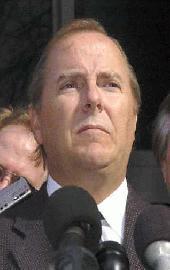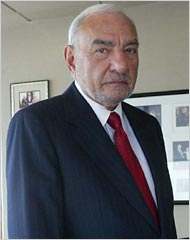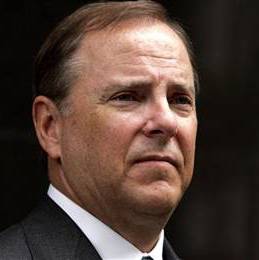 The stench of prosecutorial abuse has long hung over the Enron-related criminal cases.
The stench of prosecutorial abuse has long hung over the Enron-related criminal cases.
But the extent of that abuse became crystal clear this afternoon when the Fifth Circuit Court of Appeals granted former Enron CEO Jeff Skilling’s motion to unseal his supplemental brief relating to the government’s interview notes of former Enron CFO and chief Skilling accuser, Andrew Fastow.
The brief reveals suppression of exculpatory evidence by the Enron Task Force on a massive scale. The entire brief is devastating to the Task Force’s prosecution of Skilling and the late Enron chairman, Ken Lay. The excellent 11-page introduction of the brief includes the following passage:
The raw notes are shocking. The 420 pages of contemporaneous notes, which we have spent the last many weeks comparing to the thousands of pages of trial record and the Task Force’s pretrial disclosures, confirm our worst fears. On the most crucial issues in Skilling’s case—especially where it was only Fastow’s word against Skilling’s—the Task Force suppressed vital exculpatory evidence from its “composite” FBI Form 302s for Fastow and all other disclosures given to Skilling. The Task Force then proceeded to present critical testimony and argument at trial it knew was contradicted by the evidence withheld from Skilling.
Much of the suppressed evidence directly relates to—and refutes—the Task Force’s pivotal contention that Skilling orally agreed to “secret side deals” to manipulate Enron’s financial statements. This “side deal” theory underlies every count of conviction against Skilling.
By depriving Skilling of key exculpatory evidence that Fastow conveyed in his interviews, the Task Force was able to skew the proof and convince the jury to accept Fastow’s word over Skilling’s. As the Task Force later told Fastow’s sentencing judge and recounted in a law review article, Fastow’s testimony and credibility were the cornerstones to convicting Skilling. . . . Enron Task Force Prosecutor John C. Hueston, Behind the Scenes of the Enron Trial: Creating the Decisive Moments (“Hueston”), 44 AM. CRIM. L. REV. 197, 197-99 (2007). The substantial evidence the Task Force kept from Skilling all shares one chatacteristic—it was harmful to the Task Force’s case against Skilling. . . .
The implications of this brief reach far beyond the Skilling appeal. For example, the already-reeling re-prosecution of the three former Merrill Lynch bankers in the Enron-related Nigerian Barge case would appear to be over. The Enron Task Force in the first trial of that case not only withheld exculpatory evidence, but put on incriminating testimony from former Enron treasurer and Fastow confidant Ben Glisan that directly contradicted the exculpatory evidence that Fastow provided to Task Force prosecutors during his interviews. Other Enron-related criminal cases — as well as plea bargains — could well be affected.
I’ve often noted on this blog that fair-minded people can disagree over whether the government’s prosecutorial power is an appropriate tool to regulate business. However, my fervent hope is that even those who favor using the state’s awesome power to criminalize merely questionable business transactions will be appalled by what the prosecution did in the criminal case against Skilling and Lay, as well as the other Enron-related criminal cases.
In truth, none of us would be able to survive, as Thomas More reminds us, “in the winds that blow” from the unjust exercise of the government’s overwhelming prosecutorial power. I continue to hope that Jeff Skilling’s unjust conviction and sentence are reversed on appeal, not only for his and his family’s benefit, but also for ours.
Update: The Chronicle’s Kristen Hays, who is the only mainstream media reporter who I know of following this story, has an article on the Skilling brief here (the Chronicle story links to the copy of the Skilling supplemental brief).
Probably in response to an off-the-record response from the DOJ, Hays writes that the Skilling supplemental brief contends that “some of [Fastow’s] initial statements to authorities were not as damning as those in his testimony.” That’s a stark understatement of what the Skilling supplemental brief describes.
The initial Fastow statements set out in the Skillling brief may not have been as damning as Fastow’s trial testimony, but they were irreconcilable with that trial testimony and described completely legal activity, even by Fastow. Consequently, had the Enron Task Force not been able to pry Fastow off his original story, the core of the Task Force’s case against Skilling and Lay would not have been contradicted by Fastow, who was Skilling’s main accuser at trial.
And the fact that the DOJ did not disclose to the Skilling defense team how Fastow’s incriminating testimony evolved over time from his exculpatory initial statements while Fastow and the Task Force were negotiating a dubious plea deal is beyond reprehensible. What is the DOJ going to say now, that they didn’t disclose the exculpatory earlier statements to Skilling’s defense team because Fastow was protecting Skilling in these initial meetings? Yeah, right.
Update 2: The blogosphere is picking up the story quickly, as Larry Ribstein, Ellen Podgor (see also here) and Warren Meyer have already commented.
Curious, isn’t it, that the mainstream media is lagging well behind. Could it be that the story simply does not comport with the media’s pre-conceived notions of the Enron saga?
Update 3: The WSJ’s John Emshwiller, who covered the Lay-Skilling trial for the WSJ despite legitimate questions about his objectivity, reports on the latest developments here.
Update 4: John Hueston, the former Enron Task Force prosecutor who is quite proud of his work in nailing Skilling and Lay on an admittedly weak case, is mentioned often in the Skilling supplemental brief because of the law review article he authored that is cited in the passage above. Hueston’s law firm bio used to link to a copy of the article, but the firm took the link down some time ago. However, Cara Ellison, who has followed the Enron-related criminal cases closely, provides this handy link to Hueston’s article.
Update 5: The DOJ has replied to the Skilling Supplemental Brief. The DOJ argues essentially that, put in what the DOJ considers to be the proper context, each portion of the Fastow interview notes on which Skilling relies to establish Brady violations contains information that Skilling already had prior to trial or is evidence that would have had “minimal” value in impeaching Fastow.
Frankly, the DOJ’s analysis stands Brady on its head. The essence of Brady is that the prosecution does not retain the power to make such determinations regarding exculpatory evidence unilaterally — that information is a part of the mix that the jury and the Court sort out in determining facts and in applying the law. If what the Enron Task Force withheld here is truly harmless error, then the DOJ’s need of 70+ pages to explain why that is the case belies that contention. Ellen Podgor passes along similar thoughts regarding the DOJ’s brief here.
Like this:
Like Loading...
 Harvard Business School issued this press release and interview yesterday of Malcolm S. Salter, the Harvard professor who has written the latest book — Innovation Corrupted: The Origins and Legacy of Enron’s Collapse (Harvard University Press) — in what seems to be a continuing stream on the demise of Enron. From the looks of it, Professor Salter has figured out that the recent collapse of Bear Stearns is a good hook for his book:
Harvard Business School issued this press release and interview yesterday of Malcolm S. Salter, the Harvard professor who has written the latest book — Innovation Corrupted: The Origins and Legacy of Enron’s Collapse (Harvard University Press) — in what seems to be a continuing stream on the demise of Enron. From the looks of it, Professor Salter has figured out that the recent collapse of Bear Stearns is a good hook for his book:







